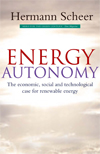 Speech of Hermann Scheer, President of EUROSOLAR, Asia-Pacific Parliamentary Conference on Renewable Energies, Gifu/Japan, June 4th, 2005
Speech of Hermann Scheer, President of EUROSOLAR, Asia-Pacific Parliamentary Conference on Renewable Energies, Gifu/Japan, June 4th, 2005Civilization faces a turning point of the general development since the beginning of the industrial age because we are at the border line of the present energy system, due to the following reasons.
First, the conventional fossil energies are running out. Whoever wants to extend the lifetime of the fossil energy system by using so-called non conventional fossil energies such as oil sands or methane bubbles on the ground of the oceans, will definitely overstress regional ecological systems and the global ecosphere.
Second, the ecological limit of fossil energy consumption is closer than the limit of the resources. The shift to renewable energies must happen now.
Third, nuclear option is not a real answer. The permanent disposal of more and more radioactive waste for more than 20,000 years cannot respond to the question which security system can work for such a long period of time. Moreover, the civilian use of the atomic power remains the bridge to the proliferation of atomic weapons, which must definitely be avoided. This is only possible by a comprehensive global nuclear disarmament and by a shift to renewable energies.
Fourth, the burning of biomass without immediate replanting - as it is practiced in many third world countries - erodes the soil, initiates desertification and provokes mass migration into over-crowding cities. That means we have to go the way from non-renewable biomass to renewable biomass.
Fifth, the curve of cheap fossil and uranium reserves will decrease. On the other hand, the curve of energy demand in the world will increase. Only renewable energy can avoid a crossing of the two curves of demand and supply in the near decades. If renewable energy is not introduced, the dangerous global economic crisis and brutal wars on energy will be the consequence. There would have been neither Gulf War nor Iraq War, if the Arabian region planted fruits instead of exploiting oil.
Sixth, the future option of atomic fusion is doubtable. No supporter of atomic fusion is asked or speaks about the costs, which will be at least three to ten times higher than for atomic fission. The former head of the Plasma Fusion Centre of MIT, M.L. Lidsky, predicted that "if the fusion program produces a reactor, no one will want it." There would be no need for another energy option if we take advantage of the solar potential which is annually 15,000 times higher than the annual world fossil and nuclear energy consumption.
Seventh, because energy is the basic need of life, it is a short sighted and dangerous economic rule to leave the basic decisions for future energy supply only to the market and the comparisons on actual energy costs. The costs for the outrunning conventional energies will go up. Renewable energy costs will go down, because they are almost exclusively technology costs, except for biomass.
Eighth, conventional fossil/atomic energies have multiple negative macro-economic side-effects such as the increasing need to protect the globalized power lines against attacks; the high water consumption for mining, extractions and for heating power stations; the currency costs for importation; the environmental and health damages. Very few people are aware of the fact that the conventional energy system is the biggest water consumer. And very few people are aware that there are millions of premature deaths annually because of energy pollution. In contrast, renewable energy sources have multiple positive macro-economic and macro-societal benefits because they help to avoid all these negative effects mentioned above.
Reason number nine: the global energy demand increases faster than the introduction of renewable energies nowadays. That means: civilization continues to run into the fossil and atomic energy trap; even with the implementation of the Kyoto-Protocol.
Reason number ten: conventional energies are politically privileged everywhere since more than a century by large amounts of public money for research and development, by military protection costs; by 300 billion dollar of subsidies annually and by the energy laws tailored for them. In contrast to this, renewable energies are politically discriminated for decades; less than a total amount of 50 billion dollars public money worldwide were spent in the last twenty years to promote renewable energies. It will be the political challenge to overcome this bias - it will be the work of parliamentarians to overcome this bias.
The result of all these facts and trends is that renewable energies are much more than an additional option to the old energy system. Renewable energies are the alternative, the general solution, able to cover all energy needs. This is doubted by many energy experts - but it is shown by many studies and not only in my books on economy that an energy system based to 100 percent on renewable energies is possible. The first famous study on this matter was done in 1979 by the Union of Concerned Scientists in the USA whose members are more than 50 recipients of Nobel Prize.
There are three basic differences between non-renewable energies and renewable energies. These three main differences are the basic philosophy for policy for renewable energies. First, renewable energies are in balance with nature, but non-renewable energies are not. Second, renewable energies are not exhaustible, but non-renewable energies will be depleted soon. Third, renewable energy sources are located everywhere, but the resources of non-renewable energies are located at only a few places on our globe - and this creates a lot of problems worldwide. This is the essential difference between energy independence and energy dependence. Relying on conventional energies results in an increased dependence of all nations on fewer and fewer mining and extraction places. Relying on renewable energies presents a unique opportunity for all to achieve energy autonomy forever.
The three most important nations of the world economy, the US, Germany and Japan, have nowadays an energy dependency of 55% in the US, 80% in Germany and 94% in Japan. This structure leads to more and more currency costs in the run of rising primary energy prices. Some "third world" countries actually pay more for the import of oil than they receive as total export revenues. That means that the present energy system prohibits their economic development.
The only possibility to change this situation is to shift to indigenous renewable energy sources. Renewable energies create a new and stable energy system. To promote them is not a single-issue matter but an all-issue matter. Higher investment costs for renewable energies today mean already less macro-economic, security, environmental protection costs and of course lower energy costs for everybody in the future. The political criterion for promoting renewable energies is the transformation of their already existing macro-political and macro-economic benefits into micro economic incentives for investors and customers. This is the main measure for policy-makers.
Many agree that renewable energy is the future. This describes the situation of the discussion on renewable energies. But too many lip services have been paid in the past and too many people are of the opinion that the promotion of renewable energy is not their job but the jobs of others. We need driving forces.
The obligations of the Kyoto Protocol are too small. It solely addresses the climate problem and is based on the assumption that more energy efficiency and renewable energies have to be considered as an economic burden – this in turn leads to a big bazaar about burden sharing. This clearly is a restricted view that does not take into account all the other motivations and reasons for overcoming the world energy crisis. This restricted view established the proceedings of global negotiations which follow the unwritten motto: "Globally talking, nationally postponing." But we have no time to postpone the shift to renewable energies.
To speed up this seminal change from the fossil and nuclear to the renewable energy age, it is necessary to reconsider all successful policy-steps for renewable energy that have been conceived of by cities and parliamentarian initiatives in different countries all over the world. The German Renewable Energy Sources Act from 2000 was the most successful one. It was initiated by German parliamentarians. The installation of 15,000 MW of renewable energy capacities within only 5 years resulted from this law: 3000 MW annually; cost reduction of 50% within five years and the creation of 130,000 new jobs. If we continue with this speed, we will have a total coverage of all electric power needs by renewable energy in 40 years. Another law from the year 2004 - the 100% tax exemption for bio-fuels for cars - started the replacement of fossil fuel dependency. A third law is in preparation: an obligation to install renewable energy technologies in all new buildings.
I appreciate this Asia Pacific parliamentary conference as an official follow-up of the International Parliamentary Forum on Renewable Energies last year in Bonn. We called in our resolution for
-
the establishment of an International Agency for Renewable Energy - in order to overcome the bias in the system of international institutions, where the IAEA and the IEA openly promote nuclear and fossil energies.
-
a distinct priority of renewable energies in the credit policies of the International Development Banks.
-
overcoming the discrimination of renewable energy technologies in the international trade.
-
an ambitious renewable energy legislation in all countries, based on the current and well-organised global communication among parliamentarians within the Parliamentarian Network of the WCRE.
I want to finalize my words with the phrase of a famous Polish author: "Most people begin by far too early to start the real important things too late." Due to the ongoing global energy crisis it is already very late. With renewable energies it is possible to reverse the energy dilemma of the world. The way to renewable energies is a way from very few highly concentrated suppliers of energy to many decentralized indigenous suppliers. It is industrial modernization for both - development of rural areas and clean air for cities. Renewable energy is the energy of the people. To promote it is the job of true representatives of the people.



